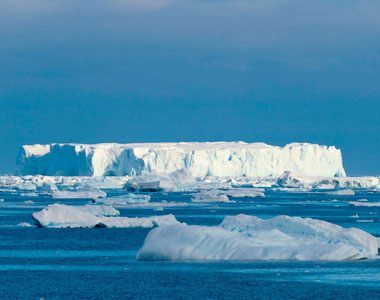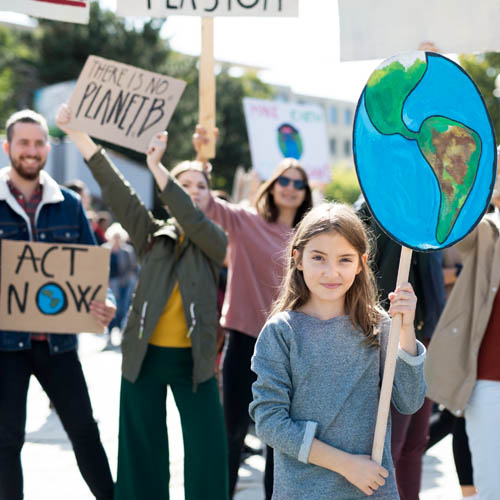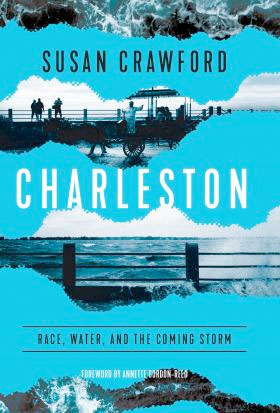 | | |  There is good reason to be concerned over the growing effects of climate change in the United States while evidence also mounts globally that what were once seen as worst-case scenarios may possibly occur within the coming decades, not the next century. A new study reveals, for instance, that melting in Antarctica could lead to a disruption of ocean circulation. There is good reason to be concerned over the growing effects of climate change in the United States while evidence also mounts globally that what were once seen as worst-case scenarios may possibly occur within the coming decades, not the next century. A new study reveals, for instance, that melting in Antarctica could lead to a disruption of ocean circulation.
Meanwhile, the Biden administration has proposed to put aside legal precedent and save what’s left of the Colorado river by evenly cutting water allotments, reducing the water delivered to California, Arizona and Nevada by as much as one-quarter. This comes after a 23-year drought and overutilization of the river that has threatened the West for decades. But while the West dries up, yet another new study has found that in the past decade, seas have drastically risen along the southern U.S. coast. That means that New Orleans, Miami, Houston and other coastal cities already at risk are being threatened more quickly that previously assumed.  Such haunting scenarios are a reason to be grateful for Earth Day (and Earth Month for that matter) when we can witness the deep global concern for the environment and the Earth that has only grown over the years. In the United States, town, cities, colleges held so many events, rallies, clean-ups, teach-ins and more that it is impossible to report them all. It is a powerful reminder that the vast majority of Americans are concerned about global climate change and environmental pollution. In the latest April survey from the respected Pew Research Center, some 70% of Americans want the nation to be carbon neutral by 2050, agreeing with one of President Biden’s key climate goals. And we want the government to take action, support global treaties, and favor ramping up solar and wind energy over fossil fuels. Such haunting scenarios are a reason to be grateful for Earth Day (and Earth Month for that matter) when we can witness the deep global concern for the environment and the Earth that has only grown over the years. In the United States, town, cities, colleges held so many events, rallies, clean-ups, teach-ins and more that it is impossible to report them all. It is a powerful reminder that the vast majority of Americans are concerned about global climate change and environmental pollution. In the latest April survey from the respected Pew Research Center, some 70% of Americans want the nation to be carbon neutral by 2050, agreeing with one of President Biden’s key climate goals. And we want the government to take action, support global treaties, and favor ramping up solar and wind energy over fossil fuels. It is only a small minority of Americans and an entrenched anti-environment and reactionary Republican Party that stands in the way, or dilutes serious action. But in the face of growing danger, there is also clear evidence that momentum is building for taking serious strides toward saving the environment. In an historic breakthrough this month, after countless negotiations, the United Nations member countries have agreed upon an international treaty to protect oceans of the world that lie outside national borders. The treaty, known as the Biodiversity Beyond National Jurisdiction Treaty (BBNJ), lays the groundwork for marine protections over previously unregulated waters and aims to protect biodiversity by establishing large-scale marine protected areas and regulating marine research for scientific and commercial development.  And, on Capitol Hill, President Biden vetoed a Congressional Review Act resolution that sought to overturn the administration’s rule to more broadly define the reach of the Clean Water Act. Then, the Republican-led House of Representatives was unable to override the President’s veto. Finally, in a similar burst of support for dirty oil and gas, House Republicans proposed an energy package to rival the 2022 Inflation Reduction Act. The package aimed to ease restrictions on oil and gas production, as well as repeal key emissions-slashing provisions. But it, too, is likely to die on the floor. And, on Capitol Hill, President Biden vetoed a Congressional Review Act resolution that sought to overturn the administration’s rule to more broadly define the reach of the Clean Water Act. Then, the Republican-led House of Representatives was unable to override the President’s veto. Finally, in a similar burst of support for dirty oil and gas, House Republicans proposed an energy package to rival the 2022 Inflation Reduction Act. The package aimed to ease restrictions on oil and gas production, as well as repeal key emissions-slashing provisions. But it, too, is likely to die on the floor.
So. There is good reason to take heart and take action as this April issue of the RCC’s Coasts and Observer goes live. It’s why almost every reader, old and young, will recognize why we highlighted the story of the release and return to the wild ocean of Lolita (Tokitae), the beloved orca who has been in captivity for fifty years at Miami’s Seaquarium. Unthinkable not many years ago, her leap to freedom is deeply symbolic and a powerful sign of hope. | | | | | | | |  Bob Musil is the President & CEO of the Rachel Carson Council and author of Rachel Carson and Her Sisters: Extraordinary Women Who Have Shaped America’s Environment (Rutgers, 2016) and Washington in Spring: A Nature Journal for a Changing Capital (Bartleby, 2016). He is also the editor of the forthcoming annotated edition from Rutgers University Press of Rachel Carson’s Under the Sea-Wind with his Introduction, updated marine science, and historic and contemporary illustrations and photographs. Bob Musil is the President & CEO of the Rachel Carson Council and author of Rachel Carson and Her Sisters: Extraordinary Women Who Have Shaped America’s Environment (Rutgers, 2016) and Washington in Spring: A Nature Journal for a Changing Capital (Bartleby, 2016). He is also the editor of the forthcoming annotated edition from Rutgers University Press of Rachel Carson’s Under the Sea-Wind with his Introduction, updated marine science, and historic and contemporary illustrations and photographs. | | | |  Bella Jaramillo is the co-lead of the RCC Coasts and Ocean program. She is a graduate of Florida State University and completing a Master's degree at Georgetown University. Bella Jaramillo is the co-lead of the RCC Coasts and Ocean program. She is a graduate of Florida State University and completing a Master's degree at Georgetown University. | | | | | | Changing Tides After almost 20 years of negotiations, United Nations member countries have agreed upon an international treaty to protect oceans of the world that lie outside national borders. These waters, known as “high seas,” occupy nearly two-thirds of the world’s oceans. Because they are considered international waters, they lie outside the jurisdiction of any state and have until now never been legally protected, meaning that the marine life in these areas has been under threat from a free-for-all of unregulated exploitation – including overfishing, pollution from ships and human-induced climate change. | | | | | | | | Biden Vetoes Clean Water Act Resolution President Joe Biden on Thursday vetoed a Congressional Review Act resolution against the administration’s rule to define the Clean Water Act’s reach. The legislation now heads back to Capitol Hill, where critics of the waters of the U.S., or WOTUS, rule lack enough support to override Biden’s veto despite support from several moderate Democrats in both the House and Senate. Thursday’s veto is the second such action by the president to defend his energy and environment policies. | | | | | | | | New Research Sparks Concerns That Ocean Circulation Will Collapse Scientists have long feared that warming could cause a breakdown of ocean circulation in the North Atlantic. But new research finds the real risk lies in Antarctica’s waters, where melting could disrupt currents in the next few decades, with profound impacts on global climate. It is being hailed as a sea change in scientific understanding of the global ocean circulation system and how it will respond as the world heats up. | | | | | | | | The GOP Donors Behind a Growing Misinformation Campaign to Stop Offshore Wind Last month, House Republicans pushed through an energy package to rival President Joe Biden’s landmark climate law, the 2022 Inflation Reduction Act. The GOP legislation — pronounced “dead on arrival” in the Democratically controlled Senate by Senate Majority Leader Chuck Schumer — aimed to ease restrictions on oil and gas production and repeal key emissions-slashing provisions in Biden’s climate spending bill. | | | | | | | | Scientists Scramble to Help Bay Scallops Survive Climate Change Researchers begin selective breeding and other initiatives in hopes of saving the East Coast’s last wild bay scallop fisheries. Stephen Tettelbach was surveying the bay scallop population in Nantucket with colleagues late in the summer of 2019 when he got the call: A longtime friend and fisherman on Long Island reported a mass die-off of scallops in Peconic Bay, Long Island’s legendary fishery. | | | | | | | | A Case of the Disappearing Waves Surfers are bearing witness to how climate change and human interventions are altering coastlines. One community in North Florida watched its revered waves disappear seemingly overnight. Middles and Blowhole, as locals called the two surf spots inside Anastasia State Park, took the Atlantic’s energy and formed consistent, world-class waves that generations of surfers in St. Johns County in the 1990s grew up riding — a rare thing for Florida. | | | | | | | | Scientists Find "unprecedented" Rates of Sea Level Rise Along Some U.S. Coasts That's 3 Times Higher Than Global Average Sea level rise has long been expected to be an ongoing and worsening problem for U.S. coasts, but scientists have found that some areas are experiencing "unprecedented" levels of rising seas, raising concerns about the fate of already vulnerable communities. A new study published in Nature Communications on Monday found that since 2010, sea level rise along the nation's Southeast and Gulf coasts has ramped up dramatically. | | | | | | | | Seas Have Drastically Risen Along Southern U.S. Coast in Past Decade Multiple new studies highlight a rate of sea level rise that is ‘unprecedented in at least 120 years’ along the Gulf of Mexico and southeastern U.S. coast Scientists have documented an abnormal and dramatic surge in sea levels along the U.S. gulf and southeastern coastlines since about 2010, raising new questions about whether New Orleans, Miami, Houston and other coastal communities might be even more at risk from rising seas than once predicted. | | | | | | | | Miami and New Orleans Face Greater Sea-level Threat Than Already Feared Coastal cities in the southern US, including Miami, Houston and New Orleans, are in even greater peril from sea-level rise than scientists already feared, according to new analysis. What experts are calling a dramatic surge in ocean levels has taken place along the US south-eastern and Gulf of Mexico coastline since 2010, one study suggests, an increase of almost 5in (12.7cm). | | | | | | | | Biden Administration Proposes Evenly Cutting Water Allotments From Colorado River As the river shrinks, the Biden administration is getting ready to impose, for the first time, reductions in water supplies to states. After months of fruitless negotiations between the states that depend on the shrinking Colorado River, the Biden administration on Tuesday proposed to put aside legal precedent and save what’s left of the river by evenly cutting water allotments, reducing the water delivered to California, Arizona and Nevada by as much as one-quarter. | | | | | | | | Lolita the Orca May Swim Free After Decades at Miami Seaquarium The killer whale, also known as Tokitae, has been in captivity for more than 50 years. Amid increasing pressure, the Seaquarium has agreed to release her. The killer whale Lolita, which has entertained generations of visitors with colossal leaps and sloppy belly flops that splashed crowds at the Miami Seaquarium, will be returning to her native waters after more than 50 years in captivity, the owner of the marine life aquarium and Miami-Dade County officials said. | | | | | | | | 1st Ocean Fish Farm Proposed For East Coast off New England A New Hampshire group wants to be the first to bring offshore fish farming to the waters off New England by raising salmon and trout in open-ocean pens miles from land, but critics fear the plan could harm the environment. The vast majority of U.S. aquaculture, the practice of raising and harvesting fish in controlled settings, takes place in coastal waters or on land, in tanks and ponds. | | | | | | | | | | | | | | Charleston
Race, Water, and the Coming Storm Susan Crawford  "Crawford’s book stands apart from its predecessors because of its sustained focus on one threatened city. Charleston is a fascinating and haunted locale, and Crawford is gifted at sketching its grossness and grace." —New York Times Book ReviewOK "Crawford’s book stands apart from its predecessors because of its sustained focus on one threatened city. Charleston is a fascinating and haunted locale, and Crawford is gifted at sketching its grossness and grace." —New York Times Book ReviewOK
An unflinching look at a beautiful, endangered, tourist-pummeled, and history-filled American city.
At least thirteen million Americans will have to move away from American coasts in the coming decades, as rising sea levels and increasingly severe storms put lives at risk and cause billions of dollars in damages. In Charleston, South Carolina, denial, boosterism, widespread development, and public complacency about racial issues compound; the city, like our country, has no plan to protect its most vulnerable. In these pages, Susan Crawford tells the story of a city that has played a central role in America's painful racial history for centuries and now, as the waters rise, stands at the intersection of climate and race.
Unbeknownst to the seven million mostly white tourists who visit the charming streets of the lower peninsula each year, the Holy City is in a deeply precarious position. Weaving science, narrative history, and the family stories of Black Charlestonians, Charleston chronicles the tumultuous recent past in the life of the city—from protests to hurricanes—while revealing the escalating risk in its future. A bellwether for other towns and cities, Charleston is emblematic of vast portions of the American coast, with a future of inundation juxtaposed against little planning to ensure a thriving future for all residents. READ MORE AND PURCHASE | | | |  The Rachel Carson Council Depends on Tax-deductible Gifts From Concerned Individuals Like You. Please Help If You Can. The Rachel Carson Council Depends on Tax-deductible Gifts From Concerned Individuals Like You. Please Help If You Can. | | | | | | | |  Sign Up Here to Receive the RCC E-News and Other RCC Newsletters, Information and Alerts. Sign Up Here to Receive the RCC E-News and Other RCC Newsletters, Information and Alerts. | | | | | | | | | | | |